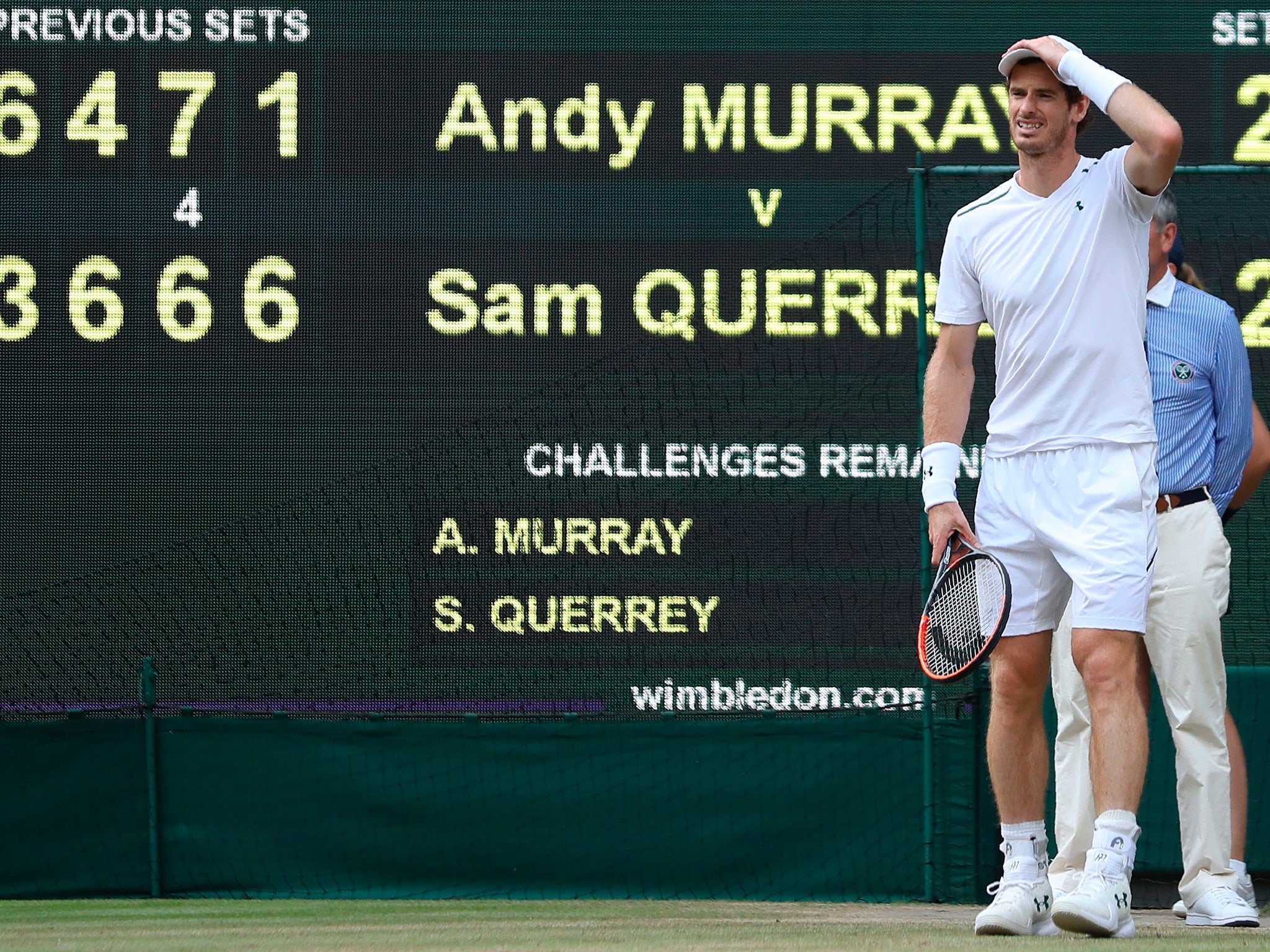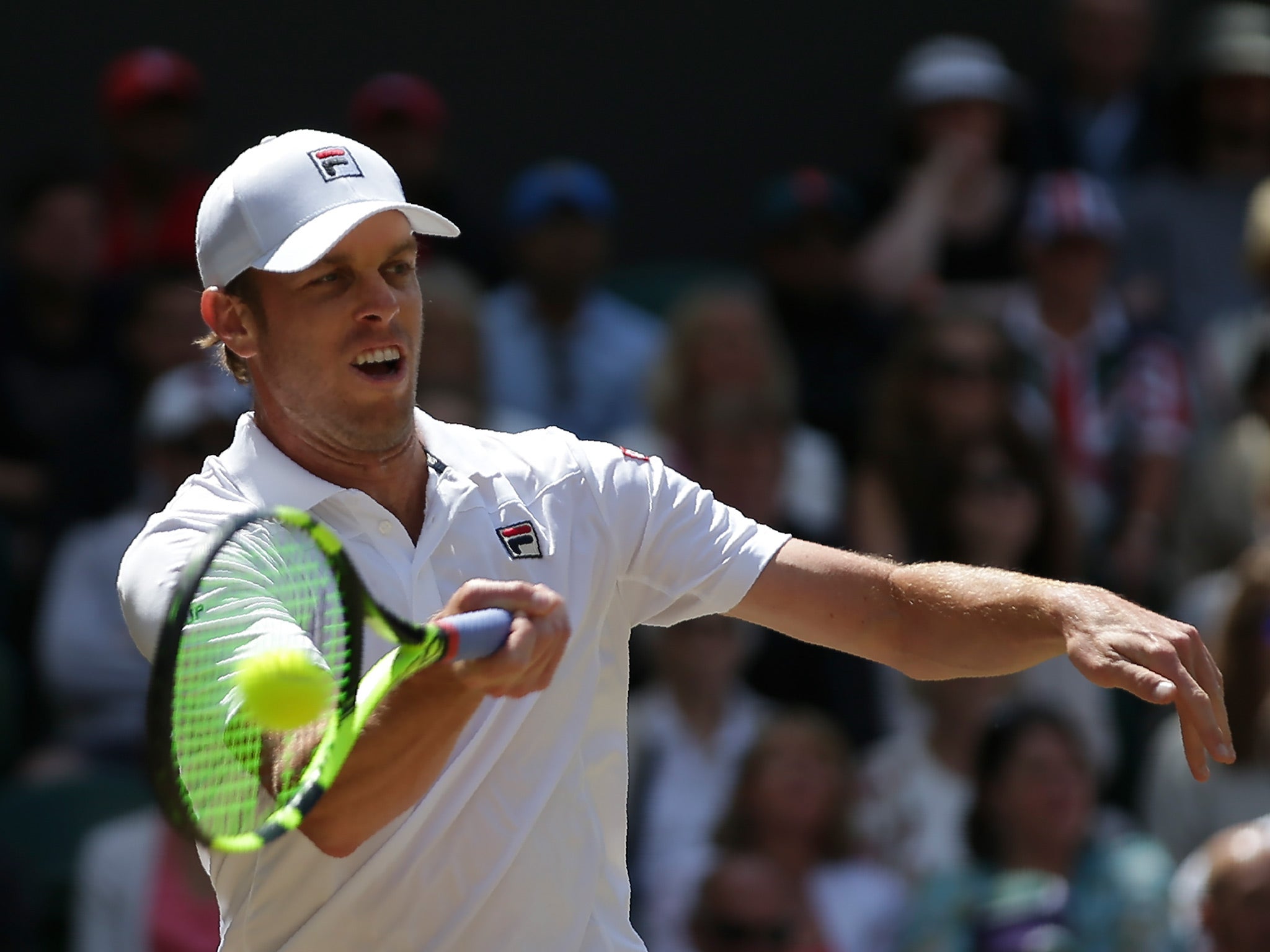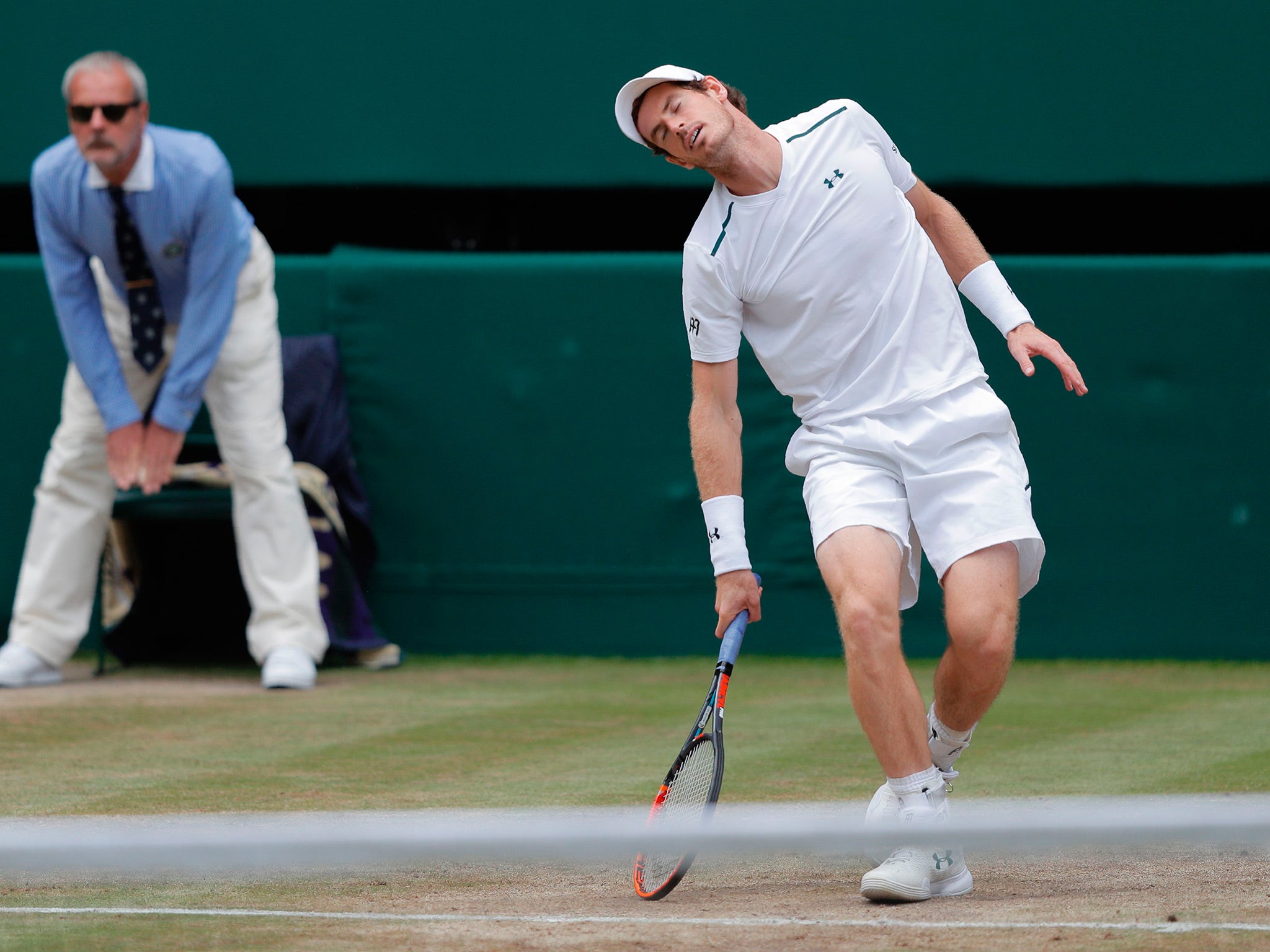Andy Murray reflects on hip injury as he crashes out of Wimbledon after defeat to Sam Querrey
Querrey is the lowest-ranked player that Murray has ever lost to at Wimbledon

Your support helps us to tell the story
From reproductive rights to climate change to Big Tech, The Independent is on the ground when the story is developing. Whether it's investigating the financials of Elon Musk's pro-Trump PAC or producing our latest documentary, 'The A Word', which shines a light on the American women fighting for reproductive rights, we know how important it is to parse out the facts from the messaging.
At such a critical moment in US history, we need reporters on the ground. Your donation allows us to keep sending journalists to speak to both sides of the story.
The Independent is trusted by Americans across the entire political spectrum. And unlike many other quality news outlets, we choose not to lock Americans out of our reporting and analysis with paywalls. We believe quality journalism should be available to everyone, paid for by those who can afford it.
Your support makes all the difference.Ten days ago it would have been no surprise to learn that one Briton would make it through to the Wimbledon singles semi-finals but few would have guessed that player would be Johanna Konta rather than Andy Murray.
However, 24 hours after Konta reached the last four here for the first time in her career, Murray suffered one of his most unexpected Wimbledon defeats when he was beaten 3-6, 6-4, 6-7, 6-1, 6-1 by Sam Querrey, the world No 28. Murray had never previously lost at Wimbledon to an opponent ranked lower than No 19 in the world.
Querrey, a fine grass-court player who knocked out Novak Djokovic here 12 months ago, grasped his chance in emphatic fashion, but the 29-year-old American also took advantage of the hip injury which has been troubling Murray throughout this grass-court season and finally caught up with him here.
The world No 1 started well enough, but from the middle of the second set onwards he was in increasing physical discomfort and by the end there was often a grimace of pain on his face.
It was a crucial blow for a player whose electrifying movement around the court has been one of his greatest strengths. Murray, playing in his tenth consecutive Wimbledon quarter-final, was unable to generate his customary power off his ground strokes and serves - his average serve speed of 101mph was 13mph slower than Querrey’s - and he sometimes gave up on shots that would have been far from certain winners if he had been fully fit. The one consolation for Murray will be that Novak Djokovic's retirement against Tomas Berdych means that the Scot will still be world No 1 next week.
“The whole tournament I've been a little bit sore, but I tried my best right to the end,” Murray said afterwards. “I gave everything I had. I'm proud about that, but it's obviously disappointing to lose at Wimbledon. There's obviously an opportunity there, so I'm sad that it's over.”
Murray, who paid credit to the quality of Querrey’s game, added: “I knew I wasn't going to do any major damage by playing, so I wanted to try, if possible, to find a way at the end. Obviously it wasn't the case.”
The Scot said he and his team had looked at “short-term solutions” to get him through Wimbledon. “I obviously managed to get through a bunch of matches and did OK,” he said. “Now I'll sit down with my team and look at the next step, look a little bit longer term. The US Open is six or seven weeks away. I’ll sit down with my team tomorrow and come up with a plan for what I have to do next.”
He added: “I'll get the best advice I can, then stick with that. If it means taking a few weeks' rest, then so be it. If it means training and doing the right rehab and stuff, then I'll do that. I have no idea of exactly what that's going to be.”
Murray, who said he would be back at work tomorrow, said the hip problem was a long-term issue. “As you get older, things are a little bit tougher to manage than they are when you're younger,” he said. “There's a bit more wear and tear there.
“I've managed to deal with it for a very long time. I'm sure moving forward I'll be able to get through it. I just need to do all of the right things and be even more diligent and professional than I have been recently. I feel like I've done all of the right stuff, but I'll try to do more, try to get myself in better shape. Hopefully I'll come through the other side of it a better player, a better athlete.”

Querrey said he had tried not to let himself be affected by Murray's physical difficulties. “I noticed it a little bit from the beginning, but I just stayed with my game,” he said. “I tried to play aggressive and keep swinging after the ball. I didn't want to alter my game and try to get into those cat-and-mouse points, because that's where he's really good. I just kept my foot down and just kept trying to pound the ball.”
Querrey, who has now knocked out the world No 1 and defending champion here two years in a row, had looked nervous at the start and appeared to be on the way out when he trailed by a set and a break, but the American’s confidence soared as Murray faded. He served with great power, attacked the net with intelligence and was striking the ball beautifully by the end. His victory ended Murray’s run of 25 wins in a row against Americans.
The Californian, whose big game matches his strapping 6ft 6in frame, will be playing in his first Grand Slam semi-final at the 42nd attempt, which is a record in the Open era. He will face Marin Cilic, who beat Gilles Muller 3-6, 7-6, 7-5, 5-7, 6-1 after three and a half hours on Court One.
I didn’t start my best, but I kept with it. I kept swinging and I really found a groove in the fourth and fifth sets.
Querrey will be the first American man to play in the last four of a Grand Slam tournament since Andy Roddick was runner-up at this tournament eight years ago. “This is a dream come true,” Querrey said afterwards. “To be in the semi-finals and to have that be at Wimbledon makes it even more special.”
With the sun breaking through but the temperature significantly cooler than last week, Murray could not have wished for a better start. The Scot held to love and had won the first seven points of the match by the time Querrey served at 0-40 in the second game.
Querrey, who appeared to be very tight at the start, finally got on the scoreboard with an ace, but a missed forehand on the next point put Murray 2-0 up. It proved to be the only break of serve in the opening set, which Murray won in just 28 minutes.
When Murray broke to go 4-3 up in the second set it seemed that he was coasting, but just when you least expected it the Scot faltered. Murray slammed his racket into the sole of his shoe in anger after playing a poor service game to allow his opponent to level at 4-4. At 4-5 the Scot made a succession of howlers before Querrey converted his second set point with a beautifully angled backhand winner.

Murray, nevertheless, can be at his most dangerous when he looks at his most vulnerable and the Scot broke immediately at the start of the third set with a deft cross-court backhand. Querrey, however, levelled at 5-5, taking advantage of a poor service game by Murray, as the set went to a tie-break.
If he had gone on to lose the match Querrey would no doubt have had nightmares for years to come about the fourth point of the tie-break, when he trailed 2-1. Murray put up a high lob which was going to land inside the service line, but Querrey chose not to let the ball bounce and hit a dreadful smash into the net. Murray was soon 6-1 up and although Querrey saved three set points he was unable to return serve on Murray’s fourth.
From 1-1 in the fourth set, however, Murray’s level dipped alarmingly. The Scot, suddenly looking flat and lethargic, was failing to chase down balls and was sometimes moving awkwardly when he did attempt to run. Querrey, sensing his chance, won 21 out of 24 points in the middle of the fourth set and broke Murray’s serve three times in a row to level the match at two sets apiece.
By the time Querrey led 3-0 in the deciding set he had won nine of the previous 10 games. Murray, ever the fighter, finally stopped the rot by holding his serve, but there was to be no stopping Querrey, who closed out victory after more than two and a half hours with his 27th ace.
“I’m still in a little bit of shock,” Querrey said after coming off court. “I was so happy to hit the serve in on the last point. I’m just thrilled right now.”
He added: “I didn’t start my best, but I kept with it. I kept swinging and I really found a groove in the fourth and fifth sets. Everything seemed to be falling my way then.”
Join our commenting forum
Join thought-provoking conversations, follow other Independent readers and see their replies
Comments